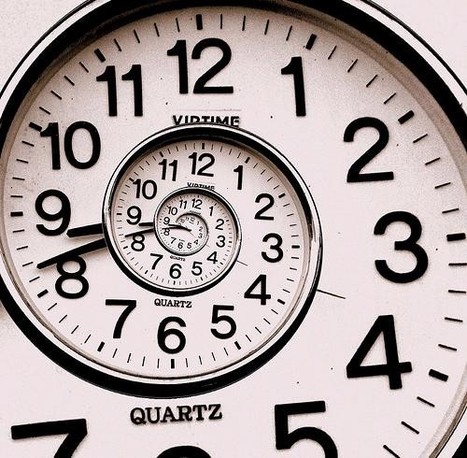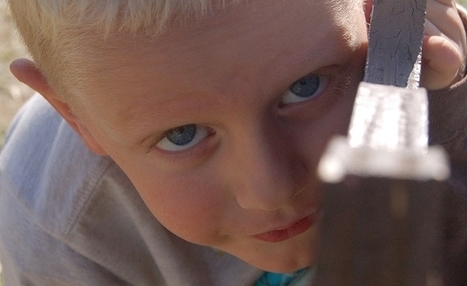Scientists may have figured out the mystery of falling head over heels and why love can make even the most levelheaded of people giddy, foolish and ridiculous.
Get Started for FREE
Sign up with Facebook Sign up with X
I don't have a Facebook or a X account


 Your new post is loading... Your new post is loading...
 Your new post is loading... Your new post is loading...
Evidence persists in the psychological literature that people's bodies sometimes unconsciously "predict" unpredictable future events. These visceral responses don't appear to be the result of sheer chance.
Many children spontaneously report memories of 'past lives'. For believers, this is evidence for reincarnation; for others, it's a psychological oddity. But what happens when they grow up?
When people consume information in a difficult-to-read font, they are likely to form a more moderate opinion of the information they have read, suggests a study just published in the Journal of Experimental Psychology.
Contrary to popular perception, stressors don't cause health problems -- it's people's reactions to the stressors that determine whether they will suffer health consequences, according to new research.
Research has shown that our perceptual system seems to pull causally-related events together – compared to two events that are thought to happen of their own accord, we perceive the first event as occurring later if we think it is the cause and we perceive the second event as occurring earlier if we think it is the outcome.
Humans form beliefs asymmetrically; we tend to discount bad news but embrace good news. This reduced impact of unfavorable information on belief updating may have important societal implications, including the generation of financial market bubbles, ill preparedness in the face of natural disasters, and overly aggressive medical decisions. Here, we selectively improved people’s tendency to incorporate bad news into their beliefs by disrupting the function of the left (but not right) inferior frontal gyrus using transcranial magnetic stimulation, thereby eliminating the engrained “good news/bad news effect.”
Researchers in the US have studied the influence of handshaking on social evaluations, finding that a firm, confident handshake “not only increases the positive effect toward a favorable interaction, but it also diminishes the impact of a negative impression.”
Liberal and conservative political beliefs are shaped by early childhood parenting environments.
Habits are behaviors wired so deeply in our brains that we perform them automatically. This allows you to follow the same route to work every day without thinking about it, liberating your brain to ponder other things, such as what to make for dinner.
However, the brain's executive command center does not completely relinquish control of habitual behavior.
People who feel powerful are more likely to return smiles of those they see as low status, according to study... 
Jade Waddy's curator insight,
September 19, 2013 7:11 AM
Hmmm, Iike to think that I return smiles quite quickly rather than ignore people (you know who you are).
Contrary to popular belief, major holidays are actually associated with a lower number of suicides, but days in the beginning of the week, and in the start of spring, were linked to more suicide attempts. 
Noah Schmidt's curator insight,
May 23, 2013 10:20 AM
The fact that there are lower suicide attempts around the holidays suggests that family support and communication can boost mood and therefore have people reconsider taking their own lives. I believe this is true because during the holidays they realize how much they are loved and how hurt their family would be if they were gone.
Women are more affected by bad news and can also remember the details better than their male counterparts, according to new research. |
Crying, for us, serves "interpersonal purposes." It becomes "a tool of our social repertory: grief and joy, shame and pride, fear and manipulation." It serves our passions shaped and inflamed by our self-consciousness and our singularly relational lives.
When you make people feel like they’re not a productive part of society they’re more likely to become an unproductive part of society.
hennessy vargas's curator insight,
March 24, 2015 12:21 AM
Automatically. immigrants already are put down by society and have to work twice as hard to prove themselves or to be successful.
Does anyone still say "full of beans"? The phrase is supposed to describe someone who's upbeat and energetic. Maybe we can revive the expression by attaching it specifically to coffee beans, as in, "I just had a double-shot cappuccino and boy, oh boy am I full of beans!"
Nich Fitzgerald's curator insight,
May 4, 2013 2:31 AM
This article is gives a great insite into how caffeine can affect your brain function.
The results of the tests suggest that scarcity of any kind creates a tendency to borrow a needed resource without thinking through the costs and benefits of that strategy. This effect lies behind the popularity of short-term, high-interest loans among the poor.
Habits are behaviors wired so deeply in our brains that we perform them automatically.
We all know that rejection seriously hurts -- and now a new study shows how it could actually be bad for our health.
They say a problem shared is a problem halved. Now a team of psychologists in the USA has performed a series of studies that suggest sharing your good news multiplies its benefits for your happiness and longer-term life satisfaction.
Dr. James Russell and a research team at the University of Cambridge recently published work on young children’s conception of personal visibility, which furthers the understanding of cognitive development and of our emerging sense of self.
Women are twice as likely as men to use emoticons in text messages, according to a new study from Rice University.
Psychologists claim that your sleeping habits may reveal the truth about your love life.
Daniel Kahneman makes an important point, one rarely addressed so directly in academic circles -- that the ego-clashes we tend to excuse among high-achievers are dangerously counterproductive when it comes to advancing human knowledge. He proposes adversarial collaboration as one alternative. |
































